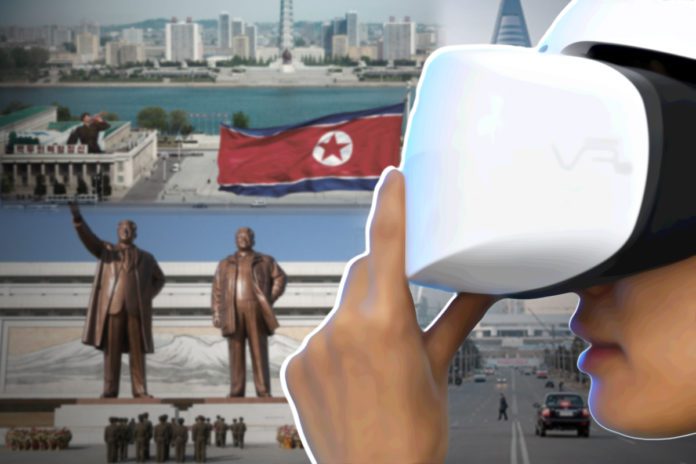As the Moon Jae-in administration comes to an end, chances for further engagement with North Korea are falling as the international community, including the United States, firmly support sanctions on Pyongyang. It is now looking into bizarre methods to increase engagement, including a virtual reality (VR) tour of North Korea.
With limited options to promote the so-called Korean Peninsula peace process due to North Korea being banned from the Olympics, the South Korean government is now trying to use VR in a far-fetched attempt to influence South Koreans to support the violent dictatorship in the North.
Some leftists in South Korea hoped that the upcoming Winter Olympics in Beijing could be the best (if not last) chance for President Moon to meet with North Korean dictator Kim Jong-un. However, this hope was dashed as the International Olympic Committee (IOC) announced that North Korea was suspended from the Beijing Olympics as a result of its unilateral decision not to participate in the Tokyo Olympics.
The Ministry of Unification announced on September 8 that it will build a facility that will feature various VR content called the “Unification Era’s Automobile VR.” The total project will cost 84 million won ($71,794) and it will be housed at the Inter-Korean Unified Culture Center located in Seoul. The unification ministry built this building using 23.8 billion won ($20.3 million) to facilitate communication between North Korean defectors and South Koreans, and it opened in May last year.
According to the ministry, it will make a facility where people can ride on a car-shaped VR machine and travel around Pyongyang, Mt. Kumgang, Kaesong, and other key tourist attractions in North Korea. The total ride would take about five minutes. The ministry plans on hearing from experts to make the experience as lifelike as possible.
“We are working on creating a program in which people can feel how it is like to drive around North Korea,” a ministry official told the Seoul Economy newspaper. “We are planning on providing young people a secondhand experience, as they are not able to physically visit North Korea.” The newspaper said that the ministry’s goal is to make the younger generation easily understand the need for the Korean Peninsula peace process that the current administration is pushing for.
Most of the comments on the article harshly criticize the plan as being ridiculous.
“Do they really think that young South Koreans would be impressed at seeing what Pyongyang is like with VR technology?” one comment read. One user wrote that, “If you [ministry officials] really like North Korea, take all your family members and go to the North.” Many other comments criticized the government for wasting taxpayer’s money on a “useless project.”
Unification Minister Lee In-young has recently made various statements calling for more interaction with North Korea. On September 2, he said the government will create an atmosphere aimed at resuming tourism to Mt. Kumgang by focusing on separated families. He also said that the government is planning on creating a special tourism zone on the east coast of the Korean Peninsula and expanding the tourism program to include Russia as well as North Korea.
Meanwhile, the U.S. Department of State extended its restriction on U.S. passport holders traveling to, in, or through North Korea on September 1. It first went into effect in 2017 and has been renewed every year. The new restriction will be applied until August 31, 2022.
On a public notice posted on the Federal Register, the State Department said that they have “determined there continues to be serious risk to U.S. citizens and nationals of arrest and long-term detention constituting imminent danger to their physical safety.” It added that “all U.S. passports shall remain invalid for travel to, in, or through the DPRK unless specially validated for such travel under the authority of the Secretary of State.”
Some humanitarian groups in the United States have complained that the restrictions will hamper their efforts to provide support to North Korea. A spokesperson at the State Department gave the following statement to the Voice of America responding to criticism by some humanitarian groups last week.
“The DPRK has created significant barriers to the delivery of assistance by closing its borders and rejecting offers of international aid, while also limiting the personnel responsible for implementing and monitoring existing humanitarian projects.”
It also implied that some of the aid could be used for their weapons programs. “We remain concerned about the human rights situation in North Korea,” the spokesperson said. “The DPRK continues to exploit its own citizens and divert resources from the country’s people to build up its unlawful nuclear and ballistic weapons programs.”
The South Korean Unification Ministry said that it will continue to look for ways to establish an atmosphere in which the two Korea can hold sports events after the IOC announced its decision to suspend North Korea from the Beijing Olympics. An official told the media on September 9 that, “As the leaders of the two Koreas have agreed, there is no change to our stance that we continue to work on creating peace through participating in international sports events such as the Olympics.”
The IOC opened the possibility for North Korean athletes to participate in the Olympics as individual participants. The official from the unification ministry said that, “We are not aware of any North Korean athletes who won a ticket to participate in the Beijing Winter Olympics.” The IOC said the decision meant the North Korean Olympic Committee would not receive financial support during the suspension and would definitively forfeit support that had previously been withheld due to sanctions.
With the prospects for Olympic diplomacy failing, the Moon government has now decided the best use of taxpayer money is a strange VR tour of a starving socialist dictatorship.


